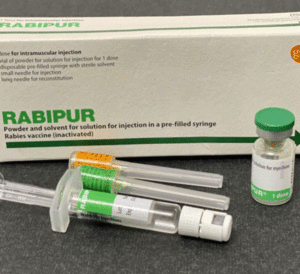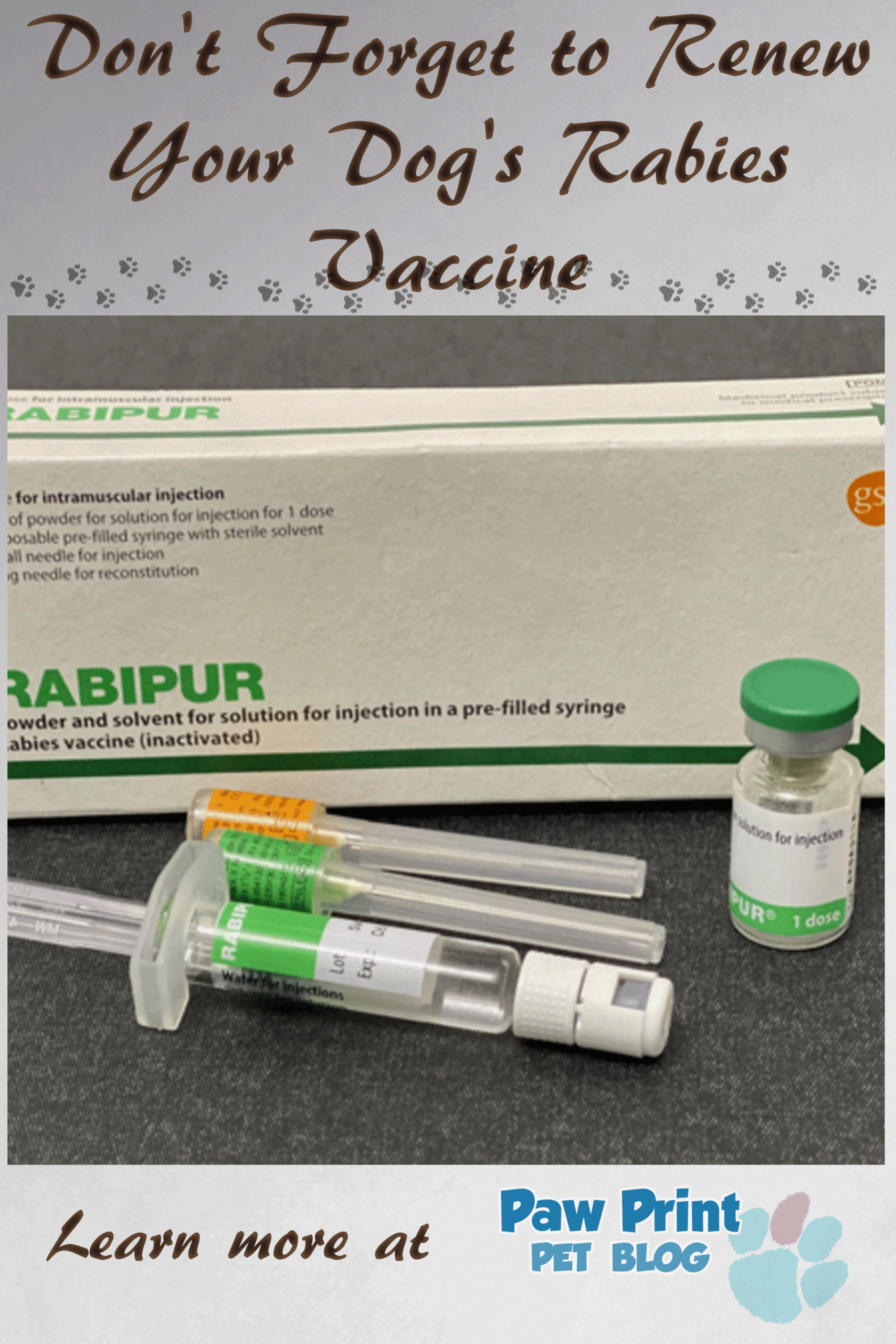With more holidays right around the corner, pet vaccination schedules are probably one of the last things on most people’s minds! However, with the new year quickly approaching, and pet license renewals looming in the near future for many pet owners, it’s important to make sure your dog is up to date on their rabies vaccine!
Post Contents:
It’s the Law
Although there is data to suggest that most vaccines protect our pets for many years, US state laws still require dogs and cats to be re-vaccinated against rabies often. Without proof of an up-to-date rabies vaccine, or (in some states) a waiver from your vet, pet owners will be unable to obtain yearly pet licenses. These licenses are required by law in most US cities and towns.
How Often Does Your Dog Need a Rabies Vaccine?

This file is licensed under the Creative Commons Attribution-Share Alike 4.0 International license. Photo Credit: Whispyhistory.
How often your pet is vaccinated against rabies can depend on how diligent owners are about keeping their pet’s vaccines up to date, and your local laws. If re-vaccinated before their current vaccine expires, most pets, after receiving an initial 1-year vaccine, will be able to receive a 3-year rabies booster rather than having to receive the vaccine annually. All US states now allow 3-year rabies vaccines. However, some individual cities/towns may still require annual or 2-year rabies vaccines instead. Check with your local government if you are unsure of the rabies vaccination rules in your town.
If you allow your dog’s rabies vaccine to expire your pet will not be able to receive the 3-year vaccine. In order to legally receive the 3-year booster, you must re-vaccinate your pet before his/her current vaccine expires.
Is Less Best?
For most owners, 3-year vaccines will not only save you money and extra trips to the vet. It is also healthier for your pet. Reactions to rabies vaccines are relatively common and can include everything from lethargy to death. Although vaccines are designed to help our pets, over-vaccinating our furry family members is thought to potentially trigger health issues. There is some evidence now that suggests that rabies vaccines can protect our pets for longer than 3-years. However, currently laws still require that rabies boosters be given at least once every 3-years.
There are currently 19 states that allow medical exemptions in place of rabies vaccinations. These states include Alabama, California, Colorado, Connecticut, Delaware, Florida, Illinois, Maine, Massachusetts, Maryland, New Hampshire, New Jersey, Nevada, New York, Oregon, Pennsylvania, Vermont, Virginia, Wisconsin. Delaware also allows for a medical exemption. But the exemption must be accompanied by a rabies titer test showing protection against rabies from prior vaccinations. Medical exemptions must be written by a vet. This is usually done for pets who are too medically fragile to be safely vaccinated.
Care for Cats

This file is licensed under the Creative Commons Attribution-Share Alike 4.0 International license. Photo Credit: www.scientificanimations.com/
If you own a cat especially, make sure to talk to your vet about what rabies products are right for your pet. Cats seem to be much more prone to developing sarcoma, or cancer, at injection sites. Rabies vaccines containing an adjuvant (used to increase vaccine effectiveness, rabies vaccines for dogs contain adjuvants because dogs seem to be less likely to developing injection site cancers), such as the current 3 year rabies vaccine for cats, have been linked to higher instances of cancers in cats. There is now a rabies vaccine for cats that does not include an adjuvant, making is safer, but it is currently only approved for annual use.
My Rabies Approach
Rabies is essentially 100% fatal to both pets and people. It’s not something you want to mess around with! I tend to be a bit of a minimalist when it comes to giving my dogs vaccines. But my two dogs are vaccinated against rabies every 3 years. The last time Kitsune was vaccinated he had a mild reaction (swelling) to the vaccine. It was luckily nothing serious enough for me to consider not giving it to him again in the future. Rabies is just never something I would feel comfortable risking! Don’t think you’re safe if you live in the city, away from wildlife! Back in 2014 I personally had a run in with rabies, and we lived in the city at the time.
Do your own research, and talk to your pet’s vet, to decide what vaccine schedule is right for your pet. No matter what vaccine schedule you choose, follow local laws. Keep your pet’s rabies vaccine up to date to avoid possibly receiving fines from your city/town, and to make sure your pet is protected in case of a bite incident.






3 Comments
Can I give my 2 senior cats (12 & 13) a 3/yr rabies vax 4 months earlier than the expiry date of the current 1/yr vax?
Our shelter has an annual rabies clinic ($10/shot for 3/yr) vs the vet ($40/shot for 1/yr).
Thank you.
I have never vaccinated my dog for rabbies it’s six months old is it late far vaccination?
Please see your vet ASAP! Puppies are very susceptible to all kinds of maladies as their immune system isn’t fully formed. Rabies is not only essential, it is the law of every state and most countries.
Besides rabies, your pup should be getting a full panel of inoculations: parvo, bordetella, etc. Having been in rescue all my life, I’ve seen the sad side of animals having no shots. Please don’t allow yours to be another.